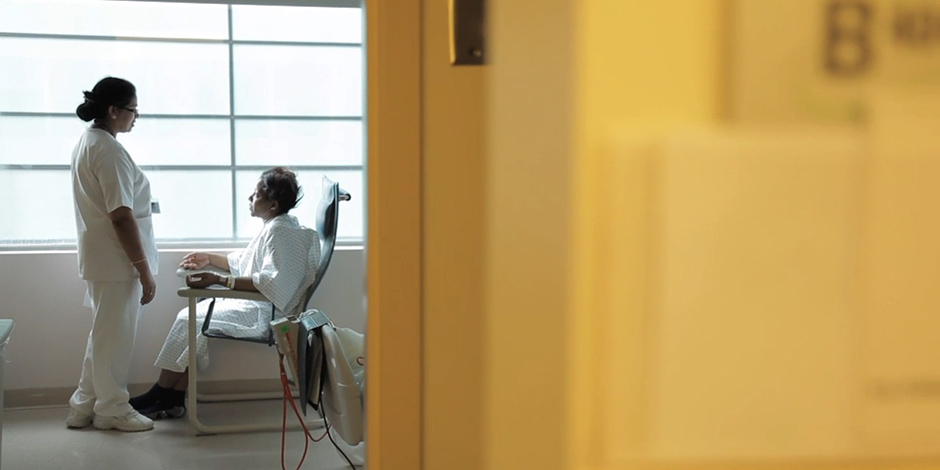NYC Health + Hospitals' Decision Tool Improves Quality of End-of-Life Care
New Guidelines for Care Providers Help Patients Lacking a Surrogate to Avoid Medically Inappropriate and Unnecessary Treatments
Dec 06, 2018

New guidelines developed by NYC Health + Hospitals to assist care providers in making life-sustaining treatment decisions for patients lacking a surrogate have led to improved end-of-life care at a long-term care facility of the public health system where it was introduced.
Details of the new application “Algorithm for the Unbefriended” at NYC Health + Hospitals/Coler and its outcomes were reported in the fall 2018 issue of the New York State Bar Association Health Law Journal.
“Patients who lack a surrogate and the ability to make informed medical decisions—often referred to as the ‘unbefriended’—pose moral and ethical dilemmas and undue stress for the clinical care team,” said Howard J. Finger, DO, incoming Co-Chairperson of the NYC Health + Hospitals Bioethics Council and lead author of the paper. Dr. Finger helped to develop the algorithm in 2016, working in close collaboration with his fellow members of the Health + Hospitals Bioethics Council. He later applied the algorithm at NYC Health + Hospitals/Coler.
“We wanted to address this weakness in the health care system at large and use it as an opportunity to develop an aid that guides an ethical, compassionate, and careful framework for all providers, one that minimizes ambiguity and the potential for arbitrary decisions to be made involving the most vulnerable population,” said Khoi Luong, DO, Chief Medical Officer at NYC Health + Hospitals/Coler and Post-Acute Care Director across the public health system. “These patients account for about 3 to 4 percent of all nursing home residents.”
The implementation of the guidelines provided structural life-sustaining decision making for 25 NYC Health + Hospitals/Coler residents from June 2016 through December 2017. A multidisciplinary group of primary care providers, ethics consultants, nurses, social workers, and dieticians, with input from external experts on palliative care, convened to collectively make and approve all decisions, based on the guidelines’ methodology.
Most significant among the outcomes was that unnecessary or unwanted treatments were largely avoided in 68 percent, or 17 of the 25 patients. For these residents, who were elderly, frail, and debilitated, the group endorsed a reduction in patient transfers for acute care, thereby sparing them from medically inappropriate, burdensome treatments that would have been of little benefit.
“One of the major goals in developing our algorithm as a quality improvement tool was to try to avoid unnecessary acute care hospitalizations at the very end of life, and allow these individuals to die with dignity with the appropriate palliative advanced care planning in place, in relative peace and comfort within the familiar surroundings of their nursing home units, while being attended to by dedicated and compassionate caregivers who know them best,” said Dr. Luong.
Nutrition support is another critical component in end-of-life care. For 14 of the 25 (56%), all of whom were in the advanced stages of dementia, the ethics-focused group endorsed a decision for enhanced oral feedings as the more compassionate alternative to tube feeding.
Based on these and other positive outcomes and a staff satisfaction survey, the authors of the paper reported that the new tool met its intended goals to help better address end-of-life care needs of the unbefriended. The success was largely attributed to the guidelines’ transparent interdisciplinary approach, allowing each care team member to participate in decision making geared to the patient’s best interest while adhering to evidence-based best practices.
“Prior to the implementation of this structured framework, members of the care team often reported feeling uneasy and were reluctant, in the absence of a supportive mechanism in place, to address such concerns on their own,” said Dr. Luong. “This new algorithm is aligned with our patient-centered care model, which is a core value at NYC Health + Hospitals/Coler. At our facility, end-of-life care planning for these residents has transitioned from prescriptions of aggressive treatment to palliative measures aimed at increasing comfort.”
Dr. Luong emphasized that the guidelines are appropriate for only this population. If the patient has the ability to make decisions or if the patient does not have that ability but has a health proxy established to make decisions on his or her behalf, the guidelines would be unnecessary. He further noted that having a living will in place, would also deem this resource unnecessary. “The need for this tool is a reminder of the value of identifying a health care proxy and/or establishing a living will.”
“This has been an invaluable tool in de-emphasizing solo decision making by the medical attending and in empowering the interdisciplinary care team, with the ethics consultants at the helm, to fully address the goals of care for the most vulnerable patient population,” said Eric Wei, MD, Vice President and Chief Quality Officer for NYC Health + Hospitals. “What perhaps is most telling from these results is that our new tool appears to have facilitated advanced care planning. This is crucial to the effective management of nursing home residents, many of whom are in the advanced stages of dementia.”
The new “Algorithm for the Unbefriended” guidelines are compliant with applicable laws and regulations, including New York’s Family Health Care Decisions Act.
In addition to Drs. Finger and Luong, additional authors of the paper, all of whom are affiliated with NYC Health + Hospitals, are James Zisfein, MD; Cheryl A. Dury, LMSW, CCM; Ravindra Amin, MD; Steven Hahn, MD; Albina Shkolnik, MJ; and Nancy Neveloff Dubler, LLB.